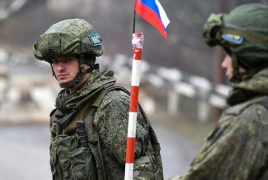
Russian peacekeepers need a clear mandate for their long-term deployment in Nagorno-Karabakh, the International Crisis Group said in its latest report.
"Peacekeepers have had their hands full but need a clearer mandate. They arrived within hours of the agreement’s signing on 10 November, as residents were still fleeing with hastily gathered belongings. A week later, they saw some of these displaced people home. Since then, peacekeepers have done everything from escorting villagers to visit graves or tend crops to fixing water pipes and mediating disputes. While they have set up checkpoints along Nagorno-Karabakh’s main thoroughfares and along the mountain road linking it to Armenia, they are based far from the front line," the ICG said.
"How long they can keep acting as troubleshooters of everyday problems is unclear. How they would react to a front-line escalation is murkier still, given that the ceasefire agreement did not spell out their mission precisely. Moscow should consult with the conflict parties and then give its troops clear rules of engagement. The parties themselves should devise, potentially with Russian mediation, a formal mechanism for resolving urgent issues, be it residents’ detention or access to water."
The Russian peacekeeping mission’s headquarters are deep inside the region in the towns of Stepanakert, Askeran and Martakert. The mission’s outposts, which often consist of a few barriers and a tent or a plastic shed, are deployed along the main roads in Armenian-populated areas of Nagorno-Karabakh. They are kilometres away, 20 to 40 minutes by car, from the new front. The mission does not patrol the front line or nearby settlements. Sometimes, peacekeepers briefly stop cars to ask if passengers have any problems.
The new topography of the front line also presents a problem for Azerbaijan, despite its relative strength. In two locations – the town of Shushi and Kelbajar region – its soldiers are disconnected from the rest of the country. Several times a week, they have to use roads that run through Armenian settlements. Russian peacekeepers serve as escorts on the condition that the trucks transport only construction materials and food, no weapons. Nagorno-Karabakh’s military says it has the right to check the trucks, but Baku denies this. In one instance, its troops found a pistol on the driver’s seat of an Azerbaijani truck, holding up the convoy for several hours until senior Russian peacekeeping officers arrived to resolve the impasse. Azerbaijan is now building a new road to Shushi and considering another route via the Murovdag mountains to Kelbajar. But roadworks in the steep, windy mountain terrain will take time, and some in Baku worry the finished route might be suitable for light vehicles only or be frequently blocked by snow.
Along parts of the front line that extend into mountain villages, Armenians have different worries. They are unlikely to be in the line of fire, but some have been briefly detained by Azerbaijanis when they have accidentally wandered over the line of contact, which is not yet clearly demarcated in these areas. Since November’s ceasefire, Azerbaijani soldiers have apprehended a handful of residents who, on their way to tend orchards or cattle in pastures, had no reason to think they had left Armenian-controlled territory. The soldiers released them all within hours after family members or neighbours raised the alarm with authorities and Russian peacekeepers. A senior Azerbaijani official told Crisis Group that the detentions were errors: “Our door should remain open to any unarmed Armenian”.

